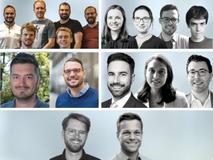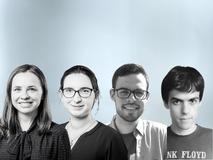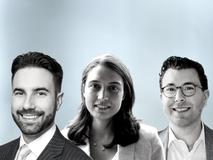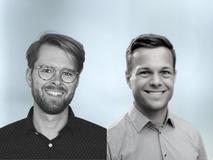Startup developing Augmented Reality glasses for remote industrial monitoring, a rapid measurement of soil health, a non-invasive sensory wearable for amputees, a visual field testing software, and data predictive control for building technology companies
27.08.2021
Almer Technologies, Digit-soil, MYLEG, PeriVision, and viboo win Venture Kick's first stage of financial and entrepreneurial support. Their projects provide a good balance with AR glasses that can be worn all day long; enable rapid and easy measurement of soil health, for better soil monitoring and food security around the world, helps amputees improve their walking abilities by using a non-invasive sensory wearable, as an add-on to their prostheses; make glaucoma diagnosis and monitoring accessible to everyone, and provide data predictive control as a cloud service to building technology companies.
 |
 Almer Technologies: in the back from left to right: Daniel Puerta (Head Supply Chain & Manufacturing), David Lorenz (Electrical Engineer from the research partner ZHAW), Stefan Kunz (Electrical Engineer from the research partner ZHAW), Stefan Pauli (Research projects and use case development), in the front from left to right: Timon Binder (CTO), Sebastian Beetschen (CEO)
|
 Digit-soil: (from left to right) CEO Hélène Iven, CTO Sonia Meller, Electrical Engineer Victor Luder, and Programmer Vit Ruzicka
|
 MYLEG Co-Founders Giacomo Valle and Stanisa Raspopovic
|
 PeriVision: (from left to right) CEO Patrick Kessel, CTO Dr. Serife Kucur, and Chairman Prof. Dr. Raphael Sznitman
|
 viboo: CEO Felix Buenning, CTO Benjamin Huber
|
Almer Technologies: Augmented Reality glasses for remote industrial monitoring
Augmented reality (AR) glasses enable simultaneous perception of reality and additional virtual information. However, today's AR glasses have either few application possibilities that differentiate them from a smartwatch (e.g., Google Glass, North Focals) or they can only be worn for short periods of time because, among other things, they are heavy (>500g) and have a short battery life (< 3h) (e.g. Microsoft Hololens). The Hololens and Magic Leap are able to do nearly everything but are clunky, heavy, and with low battery life and can therefore only be worn for a short time. On the other hand, there are glasses on the market like the Google Glass and North Focals which can be worn all day long but can only do about as much as a smartwatch. Today's AR glasses have all been drawn to these two extremes.
To tackle these issues, Almer Technologies was created by a team of experts composed of CEO Sebastian Beetschen, experience in AR-computer vision working at Microsoft Hololens, Head of Optics Lars Hermann, Ph.D. ETH Zurich, UK Cambridge, Research projects and use case development Stefan Pauli, Ph.D. ETH Zurich, CTO Timon Binder, EPFL Robotics, Head Supply Chain & Manufacturing Daniel Puerta Diaz and Advisors: Christian Brand, Jeremias Jurt, Georg Conrad. In order to increase worker productivity by 10% (e.g. for documentation and processing of checklists), AR glasses are being developed, which allow hands-free operation, long-wearing times personal eyeglass correction, and foldable temples. Almer, however, has found a way to provide a good balance with AR glasses that can be worn all day long and still are capable of supporting a wide range of applications. To do so, they focussed in the last 1.5 years on making the optical system much more efficient, in terms of lightweight, power consumption, and manufacturing. Further, they are developing the first foldable conductive temples of self-contained AR glasses and are integrating everything into a miniaturized system. The estimated market size of AR is at USD 1.64 Billion in 2018 with an annual growth of 73.8%, leading to a market potential of USD 26 Billion in 2023.
The Venture Kick funds will be used to cover the material costs for the 30 fully integrated working prototypes in mid-November 2021.
Digit-soil: A rapid measurement of soil health
Soil is essential to food production, water storage, ecosystems’ health and contributes to reducing greenhouse gases. However, according to the “Economics of land degradation”, 50% of the agricultural land is already degraded, inducing significant costs for governments. Degraded soils have a lower yield, stop performing their functions, and are often contaminated with pesticides or heavy metals, impacting human health. Therefore, we have to protect our soil by using more sustainable farming practices, and the key to this is an efficient solution to measure soil health. As modern agriculture aims at increasing productivity, it also decreases long-term soil fertility up to a tipping point where the productivity starts falling regardless of the fertilizer input.
To solve this major issue, Digit-soil's team offers a novel device giving a fast and accurate measurement of soil health by targeting soil enzyme activity and a set of other parameters, an essential soi health indicator. The founders from ETH Zürich are Dr. Sonia Meller, head of product development, Ph.D. in soil sciences, and Hélène Iven, head of business and finance, BSc in agricultural sciences and MSc in environmental sciences, ETH Zürich. Team members are Victor Luder, electrical engineer, ETH Zürich, Ricardo Stirnimann, mechanical engineer, ETH Zürich, Vít Ružika, AI expert, Ph.D. student Oxford University and Sandro Leugger, business advisor, MA HSG. Their advisors are Prof. Emmanuel Frossard, ETHZ, group of Plant Nutrition, and Michael Stucky, Pioneer Fellowship and business coach. Their proprietary algorithms analyze the collected data and issue recommendations to farmers on how to most efficiently treat their arable land, helping them to ensure long-term crop yield. They plan to sell their sensors to farmers as electronic devices and the membranes as consumables (razor-and-blades model) and provide the data analysis platform as a yearly subscription. Their product addresses the AgTech market, which will reach a total value of USD 22 billion by 2025 according to a study from Juniper Research.
The Venture Kick financing will serve to purchase the prototype’s material cost necessary to the product-market fit, to implement customers’ feedback, and finally, for hiring interns. At the beginning of 2022, they plan to hire a sales manager and an expert in product manufacturing. www.digit-soil.com
MYLEG: a non-invasive sensory wearable for amputees
Leg amputees wear commercial prosthetic devices that do not give any sensory information about the interaction of the device with the ground or its movement. Amputees, relying on very limited and uncomfortable haptic information from the stump-socket interaction, face grave impairments: risk of falls, decreased mobility, perception of the prosthesis as an extraneous body (low embodiment), and increased cognitive burden during walking with consequent psychological distress and device abandonment.
Augmented reality (AR) glasses enable simultaneous perception of reality and additional virtual information. However, today's AR glasses have either few application possibilities that differentiate them from a smartwatch (e.g., Google Glass, North Focals) or they can only be worn for short periods of time because, among other things, they are heavy (>500g) and have a short battery life (< 3h) (e.g. Microsoft Hololens). The Hololens and Magic Leap are able to do nearly everything but are clunky, heavy, and with low battery life and can therefore only be worn for a short time. On the other hand, there are glasses on the market like the Google Glass and North Focals which can be worn all day long but can only do about as much as a smartwatch. Today's AR glasses have all been drawn to these two extremes.
To tackle these issues, Almer Technologies was created by a team of experts composed of CEO Sebastian Beetschen, experience in AR-computer vision working at Microsoft Hololens, Head of Optics Lars Hermann, Ph.D. ETH Zurich, UK Cambridge, Research projects and use case development Stefan Pauli, Ph.D. ETH Zurich, CTO Timon Binder, EPFL Robotics, Head Supply Chain & Manufacturing Daniel Puerta Diaz and Advisors: Christian Brand, Jeremias Jurt, Georg Conrad. In order to increase worker productivity by 10% (e.g. for documentation and processing of checklists), AR glasses are being developed, which allow hands-free operation, long-wearing times personal eyeglass correction, and foldable temples. Almer, however, has found a way to provide a good balance with AR glasses that can be worn all day long and still are capable of supporting a wide range of applications. To do so, they focussed in the last 1.5 years on making the optical system much more efficient, in terms of lightweight, power consumption, and manufacturing. Further, they are developing the first foldable conductive temples of self-contained AR glasses and are integrating everything into a miniaturized system. The estimated market size of AR is at USD 1.64 Billion in 2018 with an annual growth of 73.8%, leading to a market potential of USD 26 Billion in 2023.
The Venture Kick funds will be used to cover the material costs for the 30 fully integrated working prototypes in mid-November 2021.
Digit-soil: A rapid measurement of soil health
Soil is essential to food production, water storage, ecosystems’ health and contributes to reducing greenhouse gases. However, according to the “Economics of land degradation”, 50% of the agricultural land is already degraded, inducing significant costs for governments. Degraded soils have a lower yield, stop performing their functions, and are often contaminated with pesticides or heavy metals, impacting human health. Therefore, we have to protect our soil by using more sustainable farming practices, and the key to this is an efficient solution to measure soil health. As modern agriculture aims at increasing productivity, it also decreases long-term soil fertility up to a tipping point where the productivity starts falling regardless of the fertilizer input.
To solve this major issue, Digit-soil's team offers a novel device giving a fast and accurate measurement of soil health by targeting soil enzyme activity and a set of other parameters, an essential soi health indicator. The founders from ETH Zürich are Dr. Sonia Meller, head of product development, Ph.D. in soil sciences, and Hélène Iven, head of business and finance, BSc in agricultural sciences and MSc in environmental sciences, ETH Zürich. Team members are Victor Luder, electrical engineer, ETH Zürich, Ricardo Stirnimann, mechanical engineer, ETH Zürich, Vít Ružika, AI expert, Ph.D. student Oxford University and Sandro Leugger, business advisor, MA HSG. Their advisors are Prof. Emmanuel Frossard, ETHZ, group of Plant Nutrition, and Michael Stucky, Pioneer Fellowship and business coach. Their proprietary algorithms analyze the collected data and issue recommendations to farmers on how to most efficiently treat their arable land, helping them to ensure long-term crop yield. They plan to sell their sensors to farmers as electronic devices and the membranes as consumables (razor-and-blades model) and provide the data analysis platform as a yearly subscription. Their product addresses the AgTech market, which will reach a total value of USD 22 billion by 2025 according to a study from Juniper Research.
The Venture Kick financing will serve to purchase the prototype’s material cost necessary to the product-market fit, to implement customers’ feedback, and finally, for hiring interns. At the beginning of 2022, they plan to hire a sales manager and an expert in product manufacturing. www.digit-soil.com
MYLEG: a non-invasive sensory wearable for amputees
Leg amputees wear commercial prosthetic devices that do not give any sensory information about the interaction of the device with the ground or its movement. Amputees, relying on very limited and uncomfortable haptic information from the stump-socket interaction, face grave impairments: risk of falls, decreased mobility, perception of the prosthesis as an extraneous body (low embodiment), and increased cognitive burden during walking with consequent psychological distress and device abandonment.
MYLEG project is co-founded by Dr. Giacomo Valle, a neural engineer and student a Sitem-School TMBE Bern, and Dr. Stanisa Raspopovic, an expert in neuroengineering and prosthetics. Team members are Lauren Chee, an electronic engineer working on the hardware and software, Greta Preatoni a neuropsychologist expert in cognitive/psychological integration of prostheses. Dr. Heiko Visarius is the Innosuisse Medtech Coach and Dr. Marko Bumbasirevic MD is the Clinical Advisor. Their innovation improves mobility and prosthesis cognitive integration, by restoring sensory feedback, in people with leg amputation during their daily life. Their product MYLEG does not need surgery to be used and can be added to the currently available commercial prostheses. There are no commercial devices similar to this one. It will enable users to avoid falls, to increase confidence in the device and fatigue. Healthcare will save money to treat complications connected to unphysiological walking, with a decrease of the long-term medical problems and lifetime medical costs associated with a sedentary lifestyle or immobility (Between CHF 75 and 93 billion/year). It will enable saving money to cure the consequences of falls of amputees. The project's future uptake is directly related to the constant growth of the Prosthetics Market which was valued at CHF 1.2 billion in 2019 with a CAGR of 5.7%.
The Venture Kick fund will help them with the definition and contracting of the manufacturing company, with capabilities and certifications necessary for MYLEG device production.
PeriVision: portable, fast & easy-to-use visual field testing for glaucoma patients
Glaucoma is a chronic eye disorder and the leading cause of irreversible blindness. Globally, 80 million people suffer from it. The current standard medical test for diagnosis and progression monitoring is long (c. 6 min. per eye), uncomfortable for patients, thereby not always reliable, and based on bulky and expensive hardware.
PeriVision's team wants to help avoid preventable blindness across the world. The project affiliated with the University of Bern is co-founded by CEO Patrick Kessel, CTO Dr. Serife Kucur, and Chairman Prof. Dr. Raphael Sznitman. They have developed a diagnosis and disease monitoring solution that is portable, low-cost, and much more time-effective than today's standard of care. It uses AI algorithms to cut down testing times by 70% and VR headsets to make glaucoma diagnosis and monitoring accessible to everyone. PeriVision has already validated both components (VR, AI) separately in two clinical studies and several published papers, and has a first functioning MVP based on an off-the-shelf headset. The target segments are eye clinics & hospitals (~10K in US & EU), ophthalmologists (~43K), optometrists (~119K), and GPs & other HCPs (~500K), initially in the US & EU.
The team plans to use the Venture Kick Funds for market validation and regulatory consulting. Beyond this, PeriVision is also raising a seed round with private investors.
viboo: providing data predictive control to building technology companies
Buildings are responsible for a third of the worlds’ energy consumption and CO2 emissions. While refurbishments of buildings are expensive, building control systems can be upgraded easily and their operation optimized at low costs. Operating a building energy system using Model Predictive Control (MPC), which is state-of-the-art for climate control in buildings, saves significant amounts of energy and increases thermal comfort. However, MPC has never reached widespread commercial application because developing first-principle models for individual buildings is too expensive.
viboo's co-founders are CEO Felix Bünning, a Ph.D. student at the Urban Energy Systems Lab at Empa and the Automatic Control Lab at ETH Zurich, and CTO Benjamin Huber, a Research Associate at the Urban Energy Systems Lab at Empa. They offer a technology that allows operating buildings more efficiently. It is based on a combination of physics-informed machine learning (ML) and MPC. With minimal commissioning effort, the heating and cooling energy consumption of a building can be reduced by 30% while thermal comfort is improved. Due to its flexibility, the technology allows easy integration of future topics such as offering demand-flexibility or time-varying energy prices. viboo brings the technology to buildings in a scalable and cost-efficient way through a cloud software service. By that, building technology companies can interface the algorithms to make their digitized products smart and bring innovative building control to their customer's buildings immediately. Worldwide, the energy used for heating and cooling of buildings will increase from 26.6 PWh in 2020 to 39 PWh in 2050. With data-driven control, the energy consumption of buildings can be reduced by 30%. This corresponds to a global cost-saving potential of 665 billion CHF per year in 2020 and close to 1 trillion CHF in 2050. In Switzerland, the cost-saving potential is CHF 560 million and CHF 740 million per year for residential and commercial buildings, respectively.
The Venture Kick funds from the first stage will give us the opportunity to develop a minimal viable product, conduct stakeholder workshops, create and distribute surveys.
The Venture Kick fund will help them with the definition and contracting of the manufacturing company, with capabilities and certifications necessary for MYLEG device production.
PeriVision: portable, fast & easy-to-use visual field testing for glaucoma patients
Glaucoma is a chronic eye disorder and the leading cause of irreversible blindness. Globally, 80 million people suffer from it. The current standard medical test for diagnosis and progression monitoring is long (c. 6 min. per eye), uncomfortable for patients, thereby not always reliable, and based on bulky and expensive hardware.
PeriVision's team wants to help avoid preventable blindness across the world. The project affiliated with the University of Bern is co-founded by CEO Patrick Kessel, CTO Dr. Serife Kucur, and Chairman Prof. Dr. Raphael Sznitman. They have developed a diagnosis and disease monitoring solution that is portable, low-cost, and much more time-effective than today's standard of care. It uses AI algorithms to cut down testing times by 70% and VR headsets to make glaucoma diagnosis and monitoring accessible to everyone. PeriVision has already validated both components (VR, AI) separately in two clinical studies and several published papers, and has a first functioning MVP based on an off-the-shelf headset. The target segments are eye clinics & hospitals (~10K in US & EU), ophthalmologists (~43K), optometrists (~119K), and GPs & other HCPs (~500K), initially in the US & EU.
The team plans to use the Venture Kick Funds for market validation and regulatory consulting. Beyond this, PeriVision is also raising a seed round with private investors.
viboo: providing data predictive control to building technology companies
Buildings are responsible for a third of the worlds’ energy consumption and CO2 emissions. While refurbishments of buildings are expensive, building control systems can be upgraded easily and their operation optimized at low costs. Operating a building energy system using Model Predictive Control (MPC), which is state-of-the-art for climate control in buildings, saves significant amounts of energy and increases thermal comfort. However, MPC has never reached widespread commercial application because developing first-principle models for individual buildings is too expensive.
viboo's co-founders are CEO Felix Bünning, a Ph.D. student at the Urban Energy Systems Lab at Empa and the Automatic Control Lab at ETH Zurich, and CTO Benjamin Huber, a Research Associate at the Urban Energy Systems Lab at Empa. They offer a technology that allows operating buildings more efficiently. It is based on a combination of physics-informed machine learning (ML) and MPC. With minimal commissioning effort, the heating and cooling energy consumption of a building can be reduced by 30% while thermal comfort is improved. Due to its flexibility, the technology allows easy integration of future topics such as offering demand-flexibility or time-varying energy prices. viboo brings the technology to buildings in a scalable and cost-efficient way through a cloud software service. By that, building technology companies can interface the algorithms to make their digitized products smart and bring innovative building control to their customer's buildings immediately. Worldwide, the energy used for heating and cooling of buildings will increase from 26.6 PWh in 2020 to 39 PWh in 2050. With data-driven control, the energy consumption of buildings can be reduced by 30%. This corresponds to a global cost-saving potential of 665 billion CHF per year in 2020 and close to 1 trillion CHF in 2050. In Switzerland, the cost-saving potential is CHF 560 million and CHF 740 million per year for residential and commercial buildings, respectively.
The Venture Kick funds from the first stage will give us the opportunity to develop a minimal viable product, conduct stakeholder workshops, create and distribute surveys.


